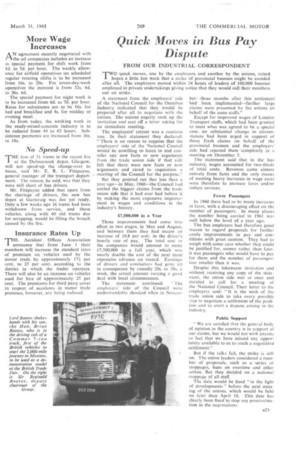Quick Moves in Bus Pay Dispute
Page 27

If you've noticed an error in this article please click here to report it so we can fix it.
FROM OUR INDUSTRIAL CORRESPONDENT 'Rquick moves, one by the employers and another by the unions, raised opes a little last week that a strike of provincial busmen might be avoided after all. The employers moved within 24 hours of leaders of 100,000 busmen employed in private undertakings giving notice that they would call their members out on strike.
A statement from the employers' side of the National Council for the Omnibus Industry indicated that they would be prepared after all to negotiate with the unions. The unions eagerly took up the invitation and sent off a letter asking for an immediate meeting.
The employers' retreat was a cautious one. In their statement they declared: "There is no reason to suppose that the employers' side of the National Council would be unwilling to listen to and consider any new facts or new arguments from the tradeunion side if that side felt that there were new facts or new arguments and cared to requisition a meeting of the Council for the purpose."
But they pointed out that less than a year ago—in May, 1960—the Council had settled the biggest claims from the trade union side that it had ever had before it by making the most expensive improvement in wages and conditions in the industry's history.
£7,500,001 in a Year Those improvements had come into effect in two stages, in May and August, and between them they had meant an increase of 10.8 per cent, in the driver's hourly rate of pay. The total cost to the companies would amount to some £7,500,000 in a full year, which was nearly double the cost of the next most expensive advance on kecord. Earnings of drivers and conductors had gone up in consequence by roundly 205. to 30s. a week, the actual amount varying a good deal with local circumstances.
The statement continued: The employers' side of the Council were understandably shocked when in Nossan
her—three months after this settlement had been implemented—further large claims were presented by the unions on behalf of the same staffs."
Except for improved wages of London Transport staffs, which had been granted to meet what was agreed to be a special case, no substantial change in circumstances had been urged in support of those fresh claims on behalf of the provincial busmen and the employers' side had rejected them 'completely at a meeting on December 5.
The statement said that in the bus industry, wages accounted for two-thirds of total costs. Revenue came almost entirely from fares and the only means of meeting heavy increases in wage costs were therefore to increase fares and/or reduce services. .
Fewer Passengers In 1960 there had to be many increases in fares, with a discouraging effect on the number of passengers. In many places the number being carried in 1961 was well below the level of a year ago.
The bus employers had therefore good reason to regard proposals for further costly improvements in pay and conditions with great caution. They had to weigh with some care whether they could be justified for, sooner rather than later, it was passengers who would have to pay for them and the number of passengers was smaller than it was.
Despite this lukewarm invitation and without receiving any copy of the statement, the union side met at once and decided to call for a meeting of the National Council. Their letter to the employers said: "it is the wish of the trade union side to take every possible step to negotiate a settlement of the problem and to avert a disnute arising in the industry.
Public. Support " We are satisfied that the general body of opinion in the country is in support of our claims, but we would not wish anyone to feel that we have missed any opportunity available to us to reach a negotiated settlement."
But if the talks fail, the strike is still on. The onion leaders considered a number of proposals, such as a series of stoppages, bans on overtime and other action. But they decided on a national stoppage of all staff.
The date would be fixed "in the light of developments" before the next meeting of the unions, which would be held no later than April 10. This date has clearly been fisted to stop any procrastination in the negotiations.








































































































